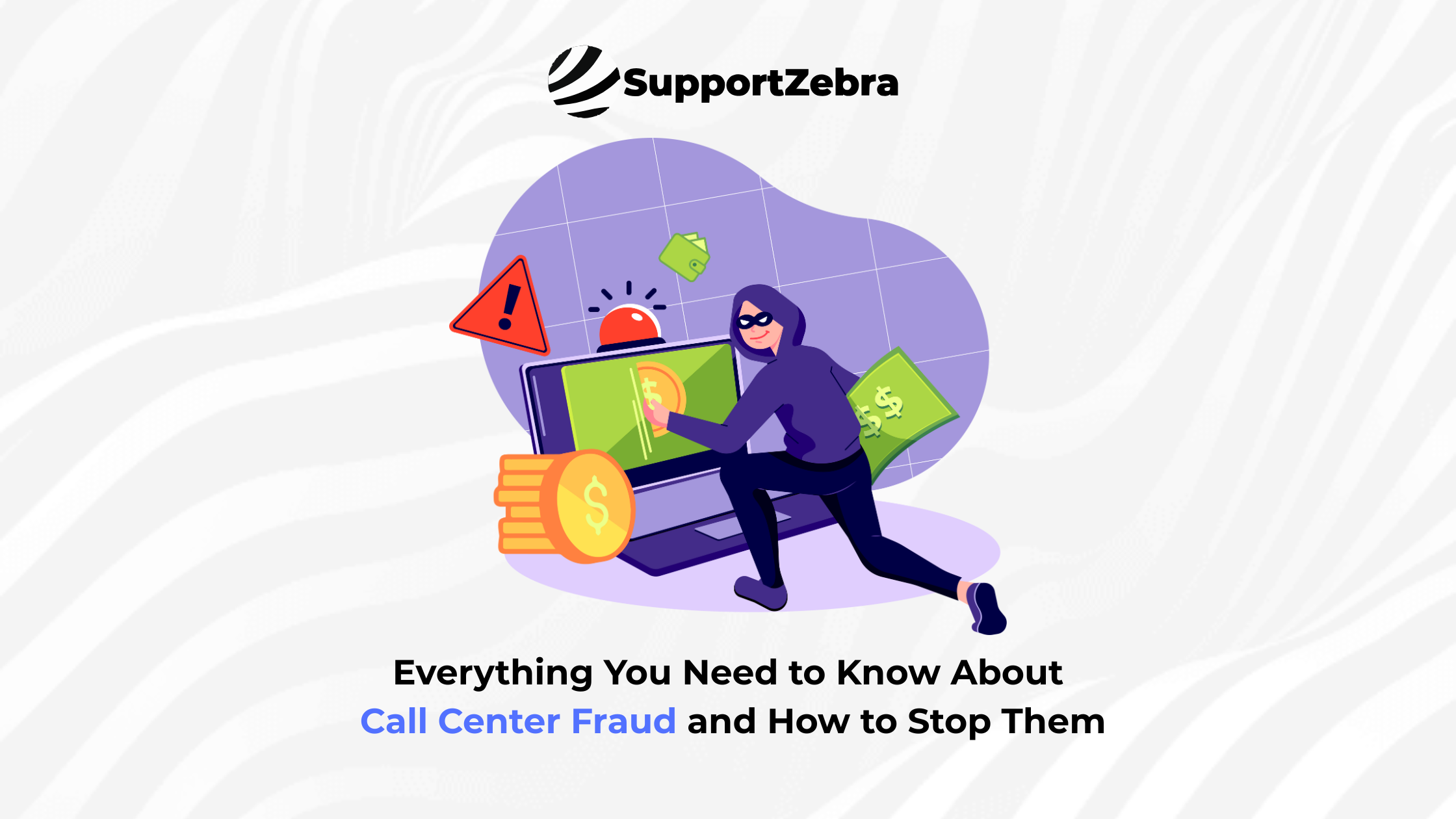How to Protect Your Company from Call Center Fraud
Key Takeaways:
- Call center fraud is on the rise, with scammers using tactics like vishing, spoofing, and social engineering to exploit vulnerabilities.
- Common scams include account takeovers, IVR hacking, and impersonation, all aimed at stealing sensitive customer data.
- Protecting against fraud requires training staff, strengthening verification, using MFA, and leveraging advanced detection tools.
- SupportZebra safeguards businesses with proactive fraud prevention strategies, continuous monitoring, and comprehensive agent training.
Digital transactions are rising, making call centers crucial for timely customer service. However, a recent report reveals a concerning trend: fraudsters increasingly target call centers. This seriously threatens customer security and creates obstacles for call centers striving to offer efficient service. The survey shows that more than half of industry experts have witnessed a surge in fraud attacks, especially in the financial sector, where 90% reported an increase, with 80% seeing rises of over 10% since 2021.
Raising awareness about this critical issue is now more important than ever. This blog will delve into the intricacies of call center fraud and offer practical strategies to combat these risks.
What is Call Center Fraud?
Call center fraud involves scammers deceiving call center operations to gain unauthorized access to customer accounts or sensitive information. They often use social engineering tactics, posing as legitimate customers or authority figures to extract personal and financial data from unsuspecting agents.
The primary aim is theft, unauthorized transactions, or identity theft, exploiting the trust inherent in call center verification processes. Due to their handling of personal data, call centers are particularly vulnerable to these sophisticated schemes.
Types of Call Center Fraud
To protect your company from call center fraud, it’s crucial to recognize common scams. Understanding these tactics allows you to safeguard critical information and customer details. Here are essential types of call center fraud to watch for:
- Vishing (Voice Phishing)
Scammers impersonate trusted companies over the phone to steal personal or financial information, often posing as bank representatives. Always verify the caller’s identity before sharing any details.
- Account Takeover
This occurs when scammers gain control of an account by changing login information, often using data obtained from phishing or social media. Training staff to recognize unusual account activity can help prevent unauthorized access.
- Caller ID Spoofing
Scammers can manipulate caller ID to appear as legitimate organizations, tricking customers into revealing private information. Encourage customers to verify any suspicious requests.
- IVR (Interactive Voice Response) Hacking
Scammers can exploit automated phone systems to conduct unauthorized transactions or access sensitive data. Enhancing security and keeping technology updated are essential.
- Impersonation Scams
Fraudsters may pose as customers or employees to deceive call center agents into disclosing private information, often using stolen data—train agents to identify unusual requests and verify identities thoroughly.
- Social Engineering Tactics
Scammers use emotional manipulation to create urgency or trust, persuading individuals to share confidential information. Training your team to recognize these tactics can help mitigate risks.
Fraudsters use tech tricks and mind games to deceive call center agents. To protect your company and customers, stay updated, train your team regularly, and utilize advanced fraud detection tools to stay ahead of scammers.
How to Protect Your Company from Call Center Fraud
To combat call center fraud effectively, develop a comprehensive plan. Equip your team with the tools and training to protect sensitive information and maintain customer trust. Here are some actionable suggestions:
- Regular Employee Training
Keep call center agents informed about the latest fraud schemes using real-life examples and role-playing to enhance their ability to identify warning signs and follow security protocols.
- Implement Multi-Factor Authentication (MFA)
Encourage agents to verify caller identities through text codes or fingerprint scans for added security.
- Verify Personally Identifiable Information (PII)
Agents must double-check sensitive data, such as social security numbers, before granting access or making changes to enhance security.
- Monitor for Suspicious Behavior
Utilize technology to detect unusual patterns or requests, allowing for early fraud detection and further verification.
- Strengthen Customer Verification Processes
Incorporate two-step verification and tools like voice recognition to create additional security layers against fraud.
- Limit Employee Access to Sensitive Information
Restrict sensitive data access to authorized personnel, ensuring only those with clearance can handle critical information.
- Utilize Advanced Technology
Implement AI-driven systems and sophisticated IVR tools to monitor unusual activities quickly, preventing potential fraud.
- Develop Crisis Management Protocols
Establish clear strategies for responding to fraud incidents and train employees to act quickly to minimize business impact.
- Conduct Regular Security Checks
Regularly review your security measures to identify vulnerabilities and adapt to new fraud tactics, ensuring robust defenses.
- Foster a Watchful Atmosphere
Encourage team members to report suspicious behavior and concerns without fear of repercussions, promoting a proactive security mindset.
Adhere to best practices to combat call center fraud effectively. Well-trained staff and advanced technology work together to protect your customers and safeguard your business from evolving threats.
SupportZebra’s Blueprint for a Secure Call Center Environment
As the online world expands, call center fraud risks increase, jeopardizing customer safety and business reputations. Companies must implement strong security measures, including thorough staff training, advanced fraud detection technology, and strict verification processes to protect sensitive information and build trust.
Educating customers on security practices is also vital in preventing fraud. By adopting a proactive approach and collaborating across the industry, businesses can significantly reduce call center fraud and foster a secure service environment.
At SupportZebra, we prioritize the fight against fraud to ensure safe interactions with our customers. Our strategy includes comprehensive training for agents to identify and manage fraud effectively. We continuously monitor and update our security measures to protect client data and interactions, maintaining high-security standards and fostering a culture of awareness and accountability across our global operations.
Contact us today to learn how we can safeguard your operations against call center fraud and enhance your security measures.

